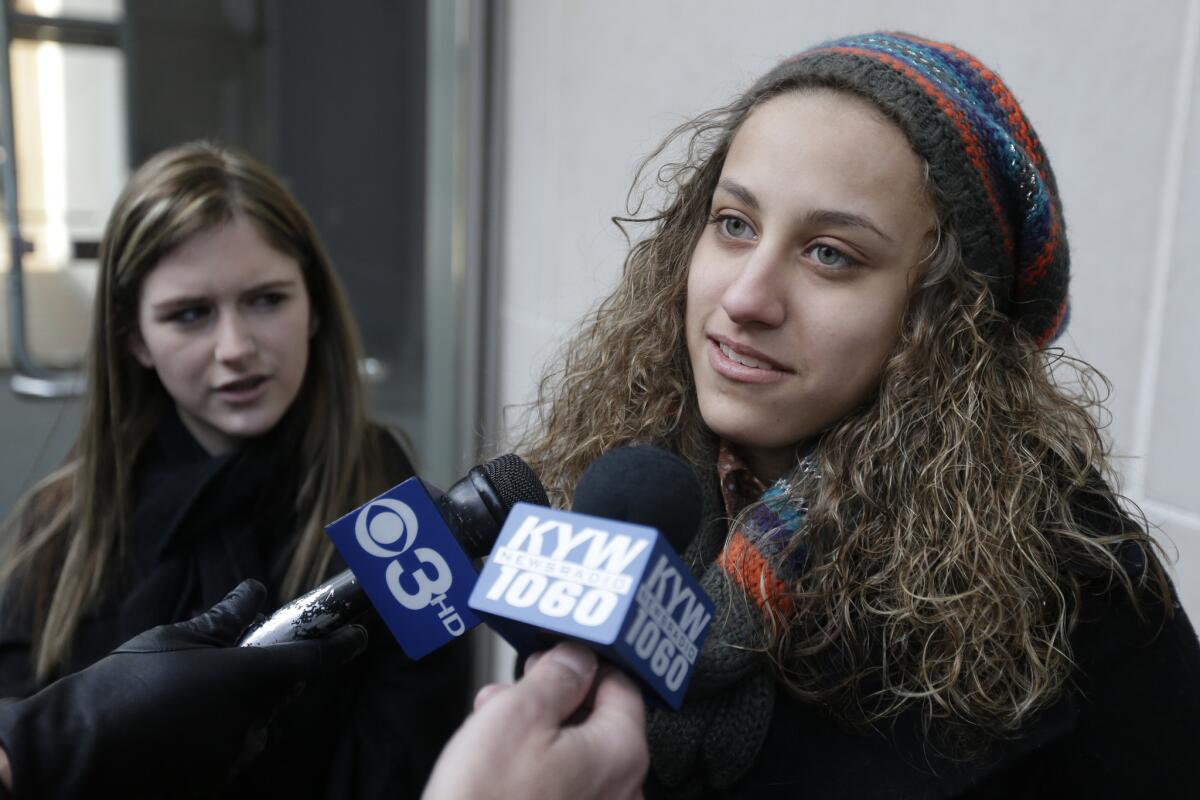‘Boobies,’ the courts and free speech

- Share via
Forty-four years ago, the Supreme Court ruled that students in public schools don’t “shed their constitutional rights to freedom of speech or expression at the schoolhouse gate.” A federal appeals court last week offered an expansive — but persuasive — interpretation of that principle.
In the landmark 1969 case Tinker vs. Des Moines School District, the court upheld the right of students to attend classes wearing black armbands to protest the Vietnam War. But an Aug. 5 decision by the U.S. 3rd Circuit Court of Appeals in Philadelphia involved a less solemn form of expressive adornment: a rubber bracelet bearing the message “I ♥ boobies! (Keep a Breast).”
By a 9-5 vote, the appeals court ruled that two middle-school girls were wrongly suspended for wearing the bracelets as part of a breast cancer awareness campaign promoted by the Keep A Breast Foundation. Initially, the Easton Area School District told Brianna Hawk and Kayla Martinez they were being punished for “disrespect, defiance and disruption,” but it later shifted ground and argued that the word “boobies” contained a “sexual double entendre.”
Sexual suggestiveness wasn’t an issue in the 1969 armband decision, which established the principle that schools may restrict student speech only if it “materially disrupts classwork or involves substantial disorder or invasion of the rights of others.” But in 1986 the court upheld the suspension of a high school student who nominated a friend for a school office in a suggestive speech. “Surely,” wrote Chief Justice Warren Burger, “it is a highly appropriate function of public school education to prohibit the use of vulgar and offensive terms in public discourse.”
The school district cited that decision as justification for its ban on the bracelets, but the appeals court rejected that argument. Writing for the majority, Judge D. Brooks Smith said that, although a school could ban expression that was “plainly lewd,” it must allow students to engage in “ambiguously lewd” speech so long as they are commenting on political or social issues.
That was the right decision. “Boobies” may be a juvenile term, but it’s not lewd. And although the distinction the court drew between “plainly lewd” and “ambiguously lewd” won’t always be crystal clear in future cases, the alternative would be to allow schools to punish speech about social issues because someone might find it suggestive.
If the school district chooses to appeal the 3rd Circuit’s decision to the Supreme Court, the stage could be set for a reconsideration of the scope of student free-speech rights. Although the court has never overruled the Tinker decision, it has narrowed its scope. Most recently, in 2007, the court upheld the suspension of a student who unfurled a banner reading “BONG HiTS 4 Jesus” on a sidewalk during a school event. Chief Justice John G. Roberts Jr. said the banner could have been reasonably interpreted as an endorsement of drug use.
At least one justice is on record as being willing to overturn the Tinker decision. In a concurring opinion in the BONG HiTS case, Justice Clarence Thomas noted approvingly that “in the earliest public schools, teachers taught, and students listened. Teachers commanded, and students obeyed.” The Tinker decision, he said, had extended students’ rights “beyond traditional bounds.”
Thomas is a conservative, but when Tinker was decided, it provoked a scathing dissent from one of the court’s great liberals and supporters of free speech, Justice Hugo Black. He ridiculed the notion that students are sent to public schools to “broadcast political or any other views.” Foreshadowing Thomas’ comments, Black wrote: “The original idea of schools, which I do not believe is yet abandoned as worthless or out of date, was that children had not yet reached the point of experience and wisdom which enabled them to teach all of their elders.”
Some present-day liberal judges are equally uncomfortable with robust free-speech protections for students. In 2006, Judge Stephen Reinhardt wrote an opinion for the U.S. 9th Circuit Court of Appeals upholding a San Diego area school’s reprimand of a Christian student who wore a T-shirt expressing his opposition to homosexuality. Reinhardt said that gay students had a right to be free from “psychological attacks that cause [them] to question their self-worth and their rightful place in society.” Under that theory, a school in California could have prohibited a student from expressing support for Proposition 8, a political issue as salient in its time as Vietnam was in the 1960s.
In his opinion in the BONG HiTS case, Thomas complained that “we continue to distance ourselves from Tinker, but we neither overrule it nor offer an explanation of when it operates and when it does not. I am afraid that our jurisprudence now says that students have a right to speak in schools except when they don’t.” He’s right, but the answer is not to overrule Tinker but to take it seriously, as the 3rd Circuit has done in the bracelet case.
In its Brown vs. Board of Education decision outlawing segregated schools, the Supreme Court said that public education “is the very foundation of good citizenship.” By allowing students to express their opinions in a civil and non-disruptive way, schools help prepare them for their responsibilities. That was true when the Tinker case was decided in 1969 and it’s true today.
More to Read
A cure for the common opinion
Get thought-provoking perspectives with our weekly newsletter.
You may occasionally receive promotional content from the Los Angeles Times.










